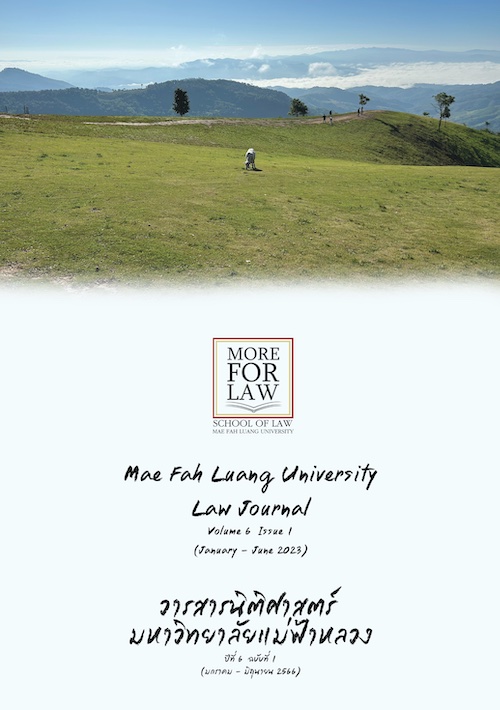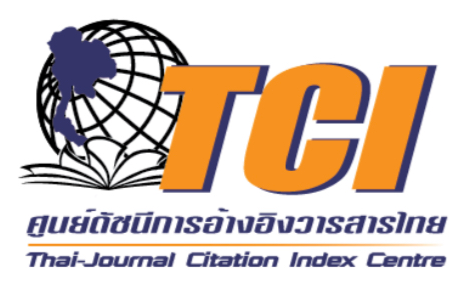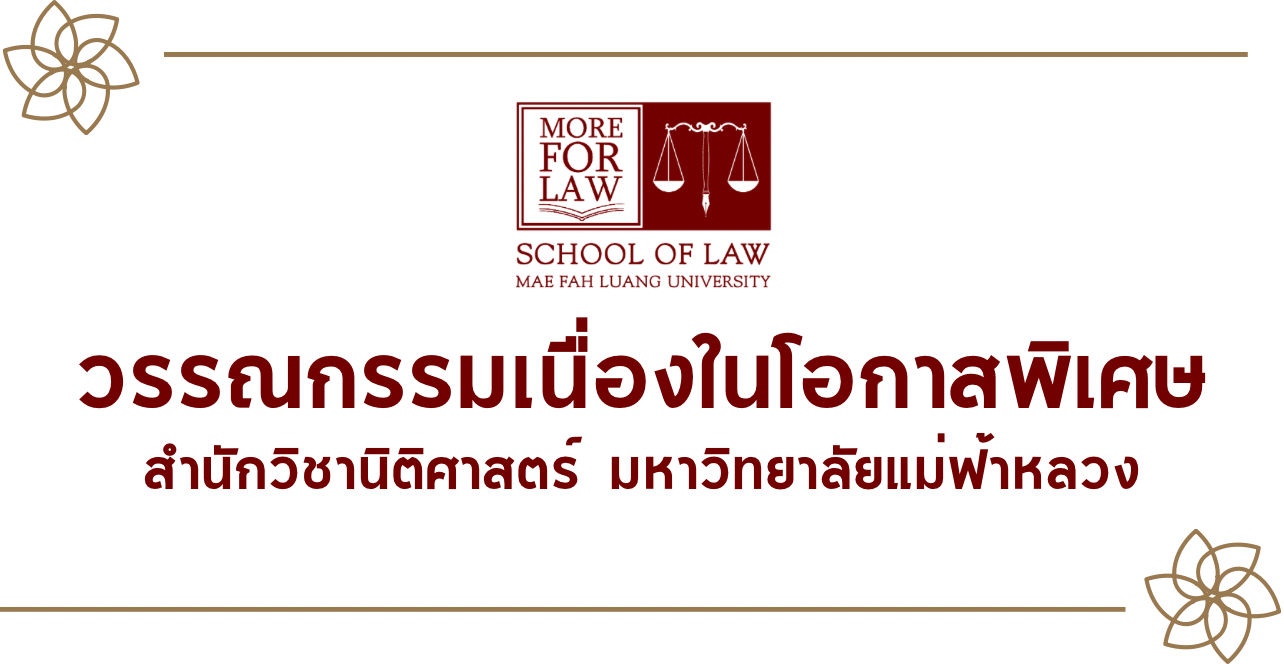กระบวนการยุติธรรมทางอาญาสำหรับเด็กและเยาวชน (ภาคต่อ)
DOI:
https://doi.org/10.14456/mfulj.2023.7คำสำคัญ:
การกระทำผิดของเด็กและเยาวชน, การเบี่ยงเบนคดี, การแก้ไขบำบัดฟื้นฟู, การกระทำผิดซ้ำบทคัดย่อ
มีผู้เคยกล่าวว่า “การลดการกระทำผิดซ้ำเป็นเป้าหมายหลักของกระบวนยุติธรรมสำหรับเด็กและเยาวชน” (Reducing recidivism is a central goal of the juvenile justice system) นอกจากการมีกฎหมายพิเศษเพื่อคุ้มครองเด็กและเยาวชนในกระบวนยุติธรรมทางอาญาอย่างพระราชบัญญัติศาลเยาวชนและครอบครัวและวิธีพิจารณาคดีเยาวชนและครอบครัว พ.ศ. 2553 แล้ว พระราชบัญญัติดังกล่าวยังออกแบบให้มีมาตรการพิเศษหลากหลายรูปแบบเพื่อแก้ไขฟื้นฟูและป้องกันไม่ให้เด็กหรือเยาวชนที่ต้องเข้าสู่กระบวนการยุติธรรมทางอาญาหวนกลับไปกระทำผิดซ้ำโดยมีหน่วยงานในกระบวนการยุติธรรมหลายฝ่ายเป็นกลไกสำคัญในฐานะผู้ปฏิบัติงานที่ช่วยกันขับเคลื่อนและผลักดันให้เจตนารมณ์ของพระราชบัญญัติดังกล่าวสัมฤทธิ์ผลเป็นรูปธรรม บทความนี้จึงมีวัตถุประสงค์เพื่อเผยแพร่ความรู้เกี่ยวกับมาตรการพิเศษต่าง ๆ เหล่านั้นว่ามีรูปแบบ ขั้นตอน และวิธีการอย่างใด แตกต่างจากการดำเนินคดีอาญาตามปกติที่มุ่งเน้นการหาตัวผู้กระทำผิดแล้วนำตัวเข้าสู่กระบวนการยุติธรรมทางอาญาเพื่อรับโทษตามกฎหมายหรือไม่ เด็กหรือเยาวชนนั้นจะได้รับการแก้ไขฟื้นฟูและป้องกันไม่ให้กระทำผิดซ้ำด้วยกลไกหรือวิธีใด ซึ่งผลลัพธ์หรือประสิทธิภาพของมาตรการพิเศษเหล่านั้นจากข้อมูลเชิงสถิติสะท้อนให้เห็นว่ามีส่วนช่วยป้องกันไม่ให้เด็กและเยาวชนหวนกลับมากระทำผิดซ้ำได้จริง แต่ลำพังหน่วยงานต่าง ๆ ในกระบวนยุติธรรมย่อมไม่อาจทำให้เด็กหรือเยาวชนนั้นได้รับการแก้ไขบำบัดฟื้นฟูได้อย่างแท้จริง ย่อมต้องอาศัยความร่วมมือที่เข้มแข็งจากสถาบันครอบครัวและชุมชนควบคู่กันไปด้วย
Downloads
เอกสารอ้างอิง
จุฬารัตน์ ยะปะนัน, นิรโทษกรรม พระราชทานอภัยโทษและการล้างมลทิน [ออนไลน์], แหล่งที่มา: http://web.senate.go.th/lawdatacenter/
บุญเพราะ แสงเทียน, กฎหมายเกี่ยวกับเยาวชนและครอบครัวแนวประยุกต์, (กรุงเทพมหานคร: สำนักพิมพ์วิทยพัฒน์, 2546).
ฝ่ายประมวลกฎหมาย กองกฎหมายกระบวนการยุติธรรม สำนักงานคณะกรรมการกฤษฎีกา, คำอธิบายกฎหมายเกี่ยวกับการล้างมลทิน [ออนไลน์], แหล่งที่มา: http://web.krisdika.go.th/data/outsitedata/article77/filenew/10.1.pdf
ภรณี เกราะแก้ว, เล่าเรื่องคดีอาญา : การใช้ดุลพินิจในการรอการกำหนดโทษหรือการรอการลงโทษ และเงื่อนไขในการคุมประพฤติจำเลย, วารสารนิติศาสตร์ มหาวิทยาลัยแม่ฟ้าหลวง, ปีที่ 4 ฉบับที่ 1 (มิถุนายน 2564).
มาตาลักษณ์ เสรเมธากุล, พระราชบัญญัติศาลเยาวชนและครอบครัวและวิธีพิจารณาคดีเยาวชนและครอบครัว พ.ศ. 2553, (กรุงเทพมหานคร: โครงการตำราและเอกสารประกอบการสอน คณะนิติศาสตร์ มหาวิทยาลัยธรรมศาสตร์, 2565).
เมธ์วดี ทองฉิม, ปัจจัยความสำเร็จในการปฏิบัติตามแผนแก้ไขบำบัดฟื้นฟูของเด็กและเยาวชนที่เข้ามาตรการพิเศษแทนการดำเนินคดีอาญาชั้นก่อนฟ้องคดีตามมาตรา 86 : กรณีศึกษาสถานพินิจและคุ้มครองเด็กและเยาวชน เขต 1, วารสารสังคมภิวัฒน์ คณะสังคมสงเคราะห์และสวัสดิการสังคม มหาวิทยาลัยหัวเฉียวเฉลิมพระเกียรติ, ปีที่ 13 ฉบับที่ 1 (เมษายน 2565).
วีนันท์กานต์ รุจิภักดิ์ และคณะ, รายงานฉบับสมบูรณ์โครงการพัฒนาแบบประเมินความเสี่ยงและความจำเป็นในการบำบัดฟื้นฟูเด็กและเยาวชนในสถานพินิจและคุ้มครองเด็กและเยาวชน [ออนไลน์], แหล่งที่มา: http://www.djop.go.th/index.php/navigations/สถาบันวิจัยและพัฒนา
ศาลจังหวัดเชียงคำ, แผนบริหารความต่อเนื่อง (Businee Continuty Plans : BCP [ออนไลน์], แหล่งที่มา: https://chkc.coj.go.th/th/file/get/file/2020072094c14c7e64b49bb3793c9dc22a8897f7133902.pdf
ศาลเยาวชนและครอบครัวกลาง, คู่มือการปฏิบัติงานของผู้พิพากษาสมทบในศูนย์ติดตามด้วยความห่วงใย [ออนไลน์], แหล่งที่มา: https://anyflip.com/vomxs/jktl
ศาลเยาวชนและครอบครัวกลาง, อธิบดีผู้พิพากษาศาลเยาวชนและครอบครัวกลางเป็นประธานในพิธีเปิดศูนย์ติดตามด้วยความห่วงใย ณ ศูนย์ติดตามด้วยความห่วงใย ชั้น 3 ศาลเยาวชนและครอบครัวกลาง [ออนไลน์], แหล่งที่มา: https://jvnc.coj.go.th/th/content/category/detail/id/22/iid/234296
สถาบันวิจัยและพัฒนา กรมพินิจและคุ้มครองเด็กและเยาวชน, โครงการศึกษาผลการใช้มาตรการทางเลือกอื่นแทนการดำเนินคดีอาญาในเด็กและเยาวชนที่เข้าสู่กระบวนการยุติธรรม [ออนไลน์], แหล่งที่มา: http://www.djop.go.th/index.php/navigations/สถาบันวิจัยและพัฒนา
สหรัฐ กิติ ศุภการ, หลักและคําพิพากษาพระราชบัญญัติศาลเยาวชนและครอบครัวและวิธีพิจารณาคดีเยาวชนและครอบครัว พ.ศ. 2553, พิมพ์ครั้งที่ 5 (กรุงเทพมหานคร: อมรินทร์พริ้นติ้งแอนด์พับลิชชิ่ง, 2563).
สำนักงานคณะกรรมการกฤษฎีกา [ออนไลน์], แหล่งที่มา: https://www.krisdika.go.th/web/guest/law?p_p_id=LawPortlet_INSTANCE_aAN7C2U5hENi&p_p_state=normal&p_p_mode=view&_LawPortlet_INSTANCE_aAN7C2U5hENi_javax.portlet.action=selectCharacterMenu&_LawPortlet_INSTANCE_aAN7C2U5hENi_character=%E0%B8%A5&_LawPortlet_INSTANCE_aAN7C2U5hENi_groupOfAct=byCharacter&_LawPortlet_INSTANCE_aAN7C2U5hENi_lawTypeId=2&p_auth=uMAhevL2&p_p_lifecycle=0
สำนักงานศาลยุติธรรม, คู่มือปฏิบัติราชการของตุลาการส่วนวิธีพิจารณาคดีเยาวชนและครอบครัว (เล่มที่ 9) พ.ศ. 2564.
สำนักแผนงานและงบประมาณ สำนักงานศาลยุติธรรม, หนังสือรายงานสถิติคดีของศาลยุติธรรม [ออนไลน์], แหล่งที่มา: https://oppb.coj.go.th/th/content/category/articles/id/8/cid/2085
iLaw, เรื่องของศาล: สัมผัสทางสายตา [ออนไลน์], แหล่งที่มา: https://ilaw.or.th/node/3130
Kristin Parsons Winokur and others, Juvenile Recidivism and Length of Stay [Online], Source: https://www.ncjrs.gov/pdffiles1/Digitization/202932NCJRS.pdf
ดาวน์โหลด
เผยแพร่แล้ว
รูปแบบการอ้างอิง
ฉบับ
ประเภทบทความ
สัญญาอนุญาต
ลิขสิทธิ์ (c) 2023 วารสารนิติศาสตร์ มหาวิทยาลัยแม่ฟ้าหลวง

อนุญาตภายใต้เงื่อนไข Creative Commons Attribution-NonCommercial-NoDerivatives 4.0 International License.






